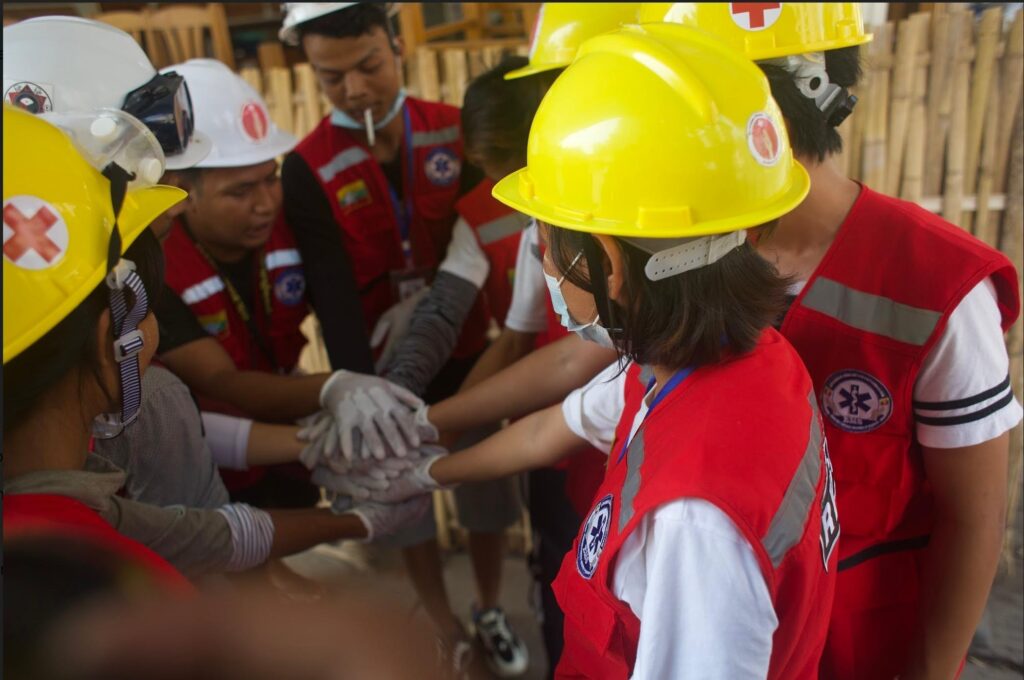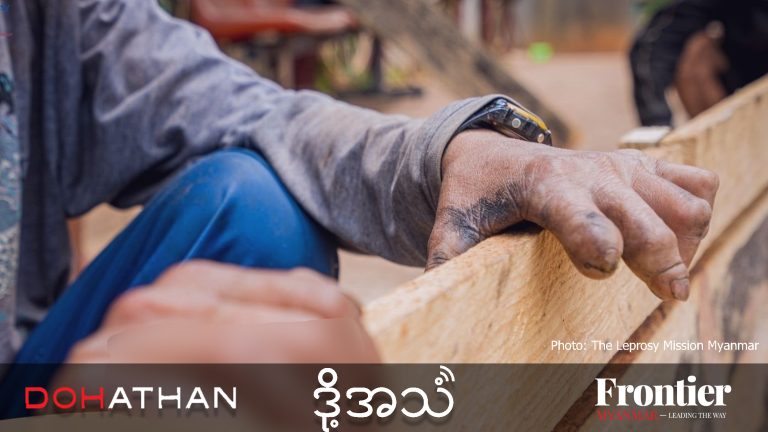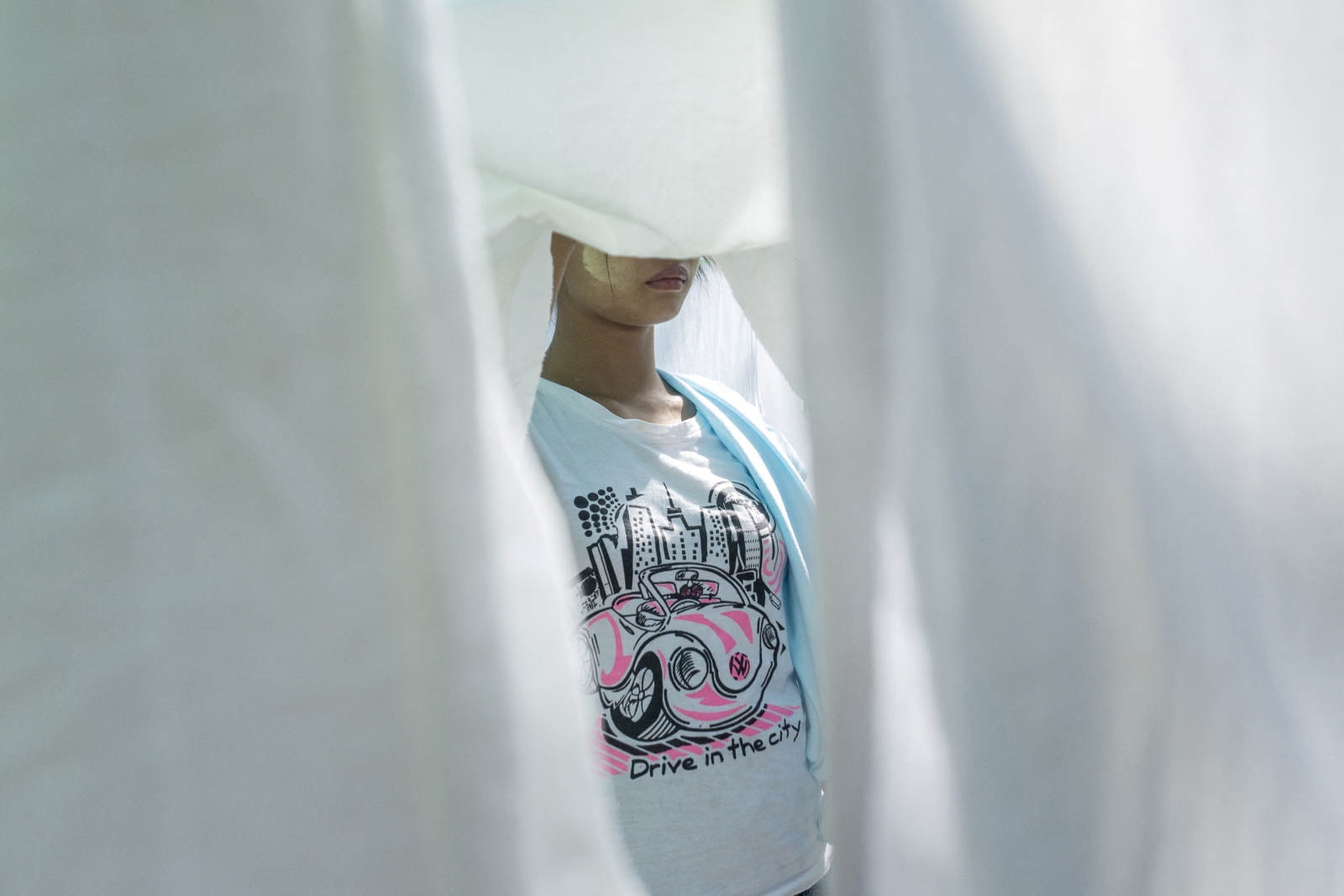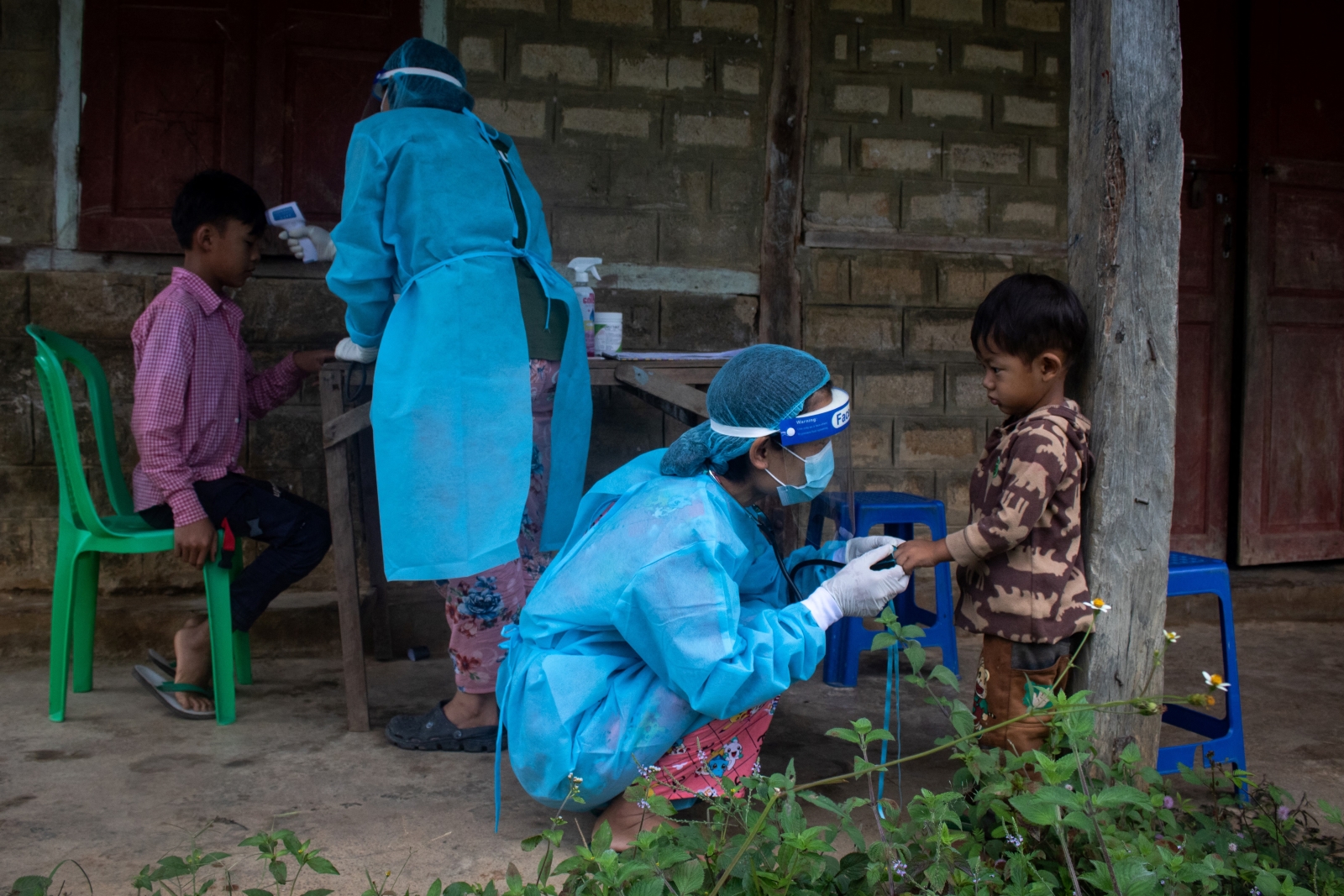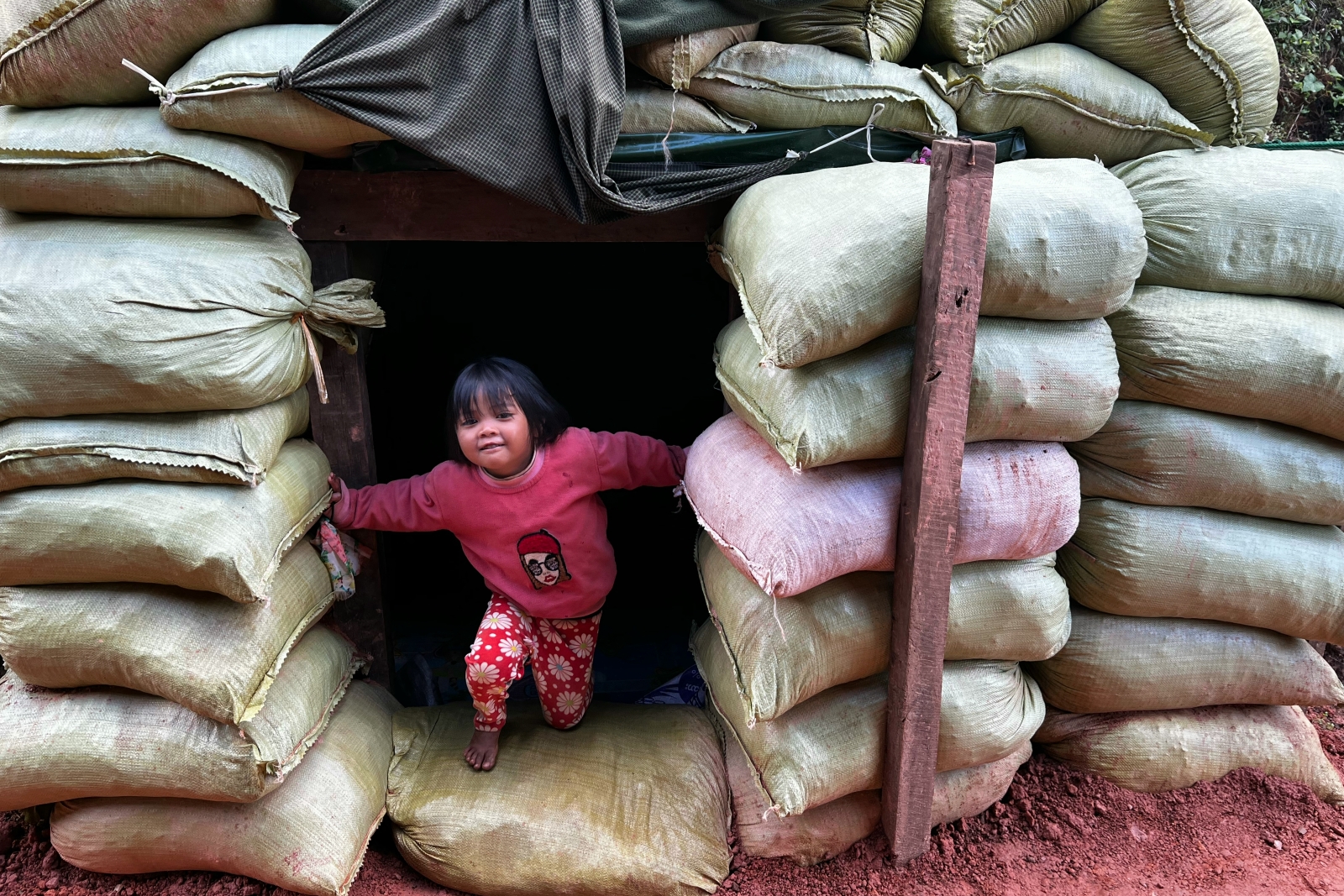Harsh new legislation and arbitrary restrictions are hampering the work of Myanmar’s voluntary aid groups, endangering the lives of conflict victims and forcing cash-strapped organisations to reconsider their future.
By FRONTIER
As a volunteer medic and ambulance driver in Mandalay, Ko Htet Myat* dodged bullets while colleagues were beaten and arrested by the military in the early days following the February 2021 coup. Nearly two years later their Payaheta Darri charity rescue service is one of a rapidly dwindling band of emergency aid groups targeted by new laws and regulations imposed by the junta.
One recent mission involved taking the body of a 40-year-old man who died of a chronic disease at Mandalay General Hospital to his native village more than 300 kilometres away, in Tilin Township in Magway Region, where a family funeral awaited. Htet Myat and two co-workers drove for eight hours through multiple military checkpoints, but their return to Mandalay took five days because of fighting along the way.
“At the time, every volunteer aid worker was anxious about his work. We are passionate about helping people, but when we get in the ambulance for a rescue, we start to feel nervous,” Htet Myat, who is 22 and has worked with Payaheta Darri since its founding in 2015, told Frontier.
“We feel like we’re giving up our lives to help and rescue people.”
Due to limited state services, charities and civil society organisations like Payaheta Darri have long played important roles in Myanmar, providing people with emergency medical care and free ambulance and funeral services. Amid the bloody crackdowns on anti-coup protests in 2021, volunteer medics assisting protesters were frequently shot at, beaten and arrested by the police and soldiers, even if their vehicles bore Red Cross stickers.
Since then, many groups have been forced to suspend operations while being hounded in military-controlled courts for allegedly assisting resistance forces, or have been ordered to comply with onerous new regulations. Operations in conflict zones have become particularly hazardous. Aid workers say people are dying because of the barriers they face.
According to the Chindwin Youths Emergency Rescue Service Group based in Monywa, the Sagaing Region capital, the junta’s regional administration ordered all charity groups on December 16 to obtain permission before aiding anyone believed injured by weapons fire or landmines.
“Patients have less chance of survival because we have to await [security forces’] permission before taking them to hospital,” Ko Kyi Thar*, founder of the Chindwin Youths group, told Frontier.
Before the coup, there were more than 100 charity organisations in the city of Monywa. Now only five rescue and funeral service groups are still operating, said Kyi Thar.
A rescue worker in Loikaw, the capital of Kayah State, which like Sagaing Region has seen intense fighting since the coup, also said it was very difficult to enter zones of conflict between the military and resistance forces.
“If we can’t go somewhere safely, we avoid going there,” Ko Nyein Chan* of Shwe Loi Kaw Rescue told Frontier.
He said that of the more than 50 charity organisations, including 20 rescue service groups, in the city of Loikaw before the coup, only two rescue groups remain. Most rescue groups in other townships in the state have also stopped, he added.
Some 30 charity groups across Myanmar interviewed by Frontier said they were working under extremely difficult conditions. Their operations are regularly blocked at the whim of regime authorities – which routinely suspect them of aiding the resistance – and donations are falling as a cost-of-living crisis bites.
In recent months, the junta has imposed tougher controls not only through local directives, but also by amending national legislation.
A revised Organization Registration Law was enacted by the junta on October 28 last year, requiring both domestic and international groups to register and submit sensitive information about their funding and operations that could put their staff at risk. Failure to register, however, can result in prison sentences for members of up to three years. Meanwhile, those who contact resistance groups – which is often essential for operating in conflict areas – can be imprisoned for up to five years under the new law.
The deadline to register passed at the end of last month but many groups have refused to do so, forcing them underground. U Aung Soe, founder of the Lawka Eae Thal blood donation charity in Yangon’s Thingangyun Township, told Frontier last month his group would not register. He is currently in hiding and was charged in absentia with incitement in 2021, although he says his group continues to donate blood to about 10 patients a month.
The junta is also limiting how far charities can operate from their area of registration.
Last month military authorities at a checkpoint in Yangon Region’s Kungyangon Township seized the ambulance, and temporarily detained the staff, of a rescue group from neighbouring Ayeyarwady Region that was carrying a patient to a hospital in Yangon.
“This means if a charity group is registered in Mawlamyine, it can do rescue services only within Mawlamyine,” said a volunteer for the Mawlamyine Rescue Organisation in the Mon State capital. “Many groups across the country will stop their activities if the regime enforces these restrictions.”
“We won’t be able to cross the Sittaung Bridge [between Bago Region and Mon State],” he said, warning that most emergency aid routes would be blocked.
Volunteers under fire
As well as issuing draconian orders, the regime has forcibly shut down and arrested members of charity groups in its attempts to bring them to heel.
The highly respected Free Funeral Service Society in Yangon suspended all operations after security forces launched a midnight raid on its office on March 3, 2021. The FFSS had said it would not assist police or military personnel with medical or funeral services.
The FFSS chair U Kyaw Thu and his wife Daw Myint Myint Khin Pe were charged with incitement and military-run media also accused the couple of “misusing” donations to support the Civil Disobedience Movement, a mass strike of government staff opposed to the coup. The pair, who are also renowned actors, are in hiding. The group’s co-founder, Daw Than Myint Aung, was imprisoned but later released on Independence Day, January 4, this year.
FFSS resumed emergency medical and funeral services in October last year. The charity’s manager declined to speak to Frontier for security reasons.
Also arrested were five Payaheta Darri colleagues of ambulance driver Htet Myat, along with 22 volunteers of another Mandalay-based rescue group, Payaheta Min Khaung, including two doctors and one nurse. They were all detained while treating injured protestors on March 27, 2021 and taken to the city’s Obo Prison.
That same day, Htet Myat came under fire while saving the life of an 18-year-old who had been shot in the back as junta forces fired live rounds at demonstrators. The 27 detainees were released in March last year, which is when Payaheta Darri resumed work.
Yet, despite mass prisoner releases, including of 5,774 inmates in November and more than 7,000 earlier this month, many charity volunteers remain behind bars. Out of more than 13,000 political prisoners counted by the Assistance Association for Political Prisoners, about 100 can be identified as charity workers, while several hundred are ex-government medical staff that joined the CDM, many of whom did voluntary work before their arrest. The monitoring group also says eight charity volunteers have been killed by the military.
U Aung Myo Min, Human Rights Minister in the parallel National Unity Government, told Frontier the crackdown on charities was driven by the junta’s insecurity.
“The terrorist military council worries the charity organisations will provide assistance to those who are active in democracy and human rights and PDF groups,” he told Frontier, referring to anti-coup armed groups known as People’s Defence Forces.
“The charity volunteers who are protecting the public have been detained because they are considered enemies by the terrorist military council,” he said.

Running on empty
According to records of the Ministry of Social Welfare, Relief and Resettlement, before the military takeover a total of 696 charity associations for rescue and funeral services were registered under the ministry across the country. Yangon Region had the most with 434, followed by Mandalay Region with 65 and Sagaing with 40.
But volunteer workers told Frontier that many small charity groups, especially in rural areas, had not been registered, and most have stopped their activities since the coup.
The disappearance of large numbers of both registered and unregistered charities has been driven not only by junta repression, but also a combination of rising costs and a decline in public donations.
“Increasing high prices of diesel and petrol and falling numbers of donors have made it hard for charity groups to continue working,” said Daw Yin Yin Hla* from a group in Yangon’s North Okkalapa Township that is still able to operate under strict junta oversight.
A leader of the Bago Rescue Organisation in Pyay, Bago Region, which is often called upon to search for the bodies of suicide victims, said he was contemplating stopping work this year. He cited falling donations and difficulties in getting fuel for ambulances.
“I’m running out of energy. The situation has got to the point where the team is considering aborting operations,” said Ko Thae Maung, who has worked for the group since its founding in 2019.
The Magway Payaheta Charity Group, which gives money and medicines to poor patients in hospitals and clinics that lack resources, says its main problem is a drop in donations because of the economic crisis.
“There are fewer donors but more people that need help,” and said U Tin Oo*, a senior worker at the group based in the Magway Region capital.
The city of Magway had 19 charity organisations before the coup, but six have since closed. Of the roughly 40 charity groups previously active in Myaing Township, elsewhere in the region, there is now only one group that helps the elderly, according to an aid worker who requested anonymity.
Kyi Thar of the Chindwin Youths rescue group said he founded the charity in 2019 with about 50 volunteers, starting first as a blood donors society and one year later becoming a rescue and funeral service group.
Now the team is down to 20 volunteers and struggling to survive. Regular income from donors has dried up, forcing Kyi Thar to pay off debts by selling his Toyota Corolla, which was used to transport patients.
“These are the hardest times we’ve ever experienced. No charity rescue and funeral service organisation can survive without regular funding,” he told Frontier.
“We will continue for as long as we can. But if there are no donors, our work will come to a stop.”
* denotes the use of a pseudonym for safety reasons


